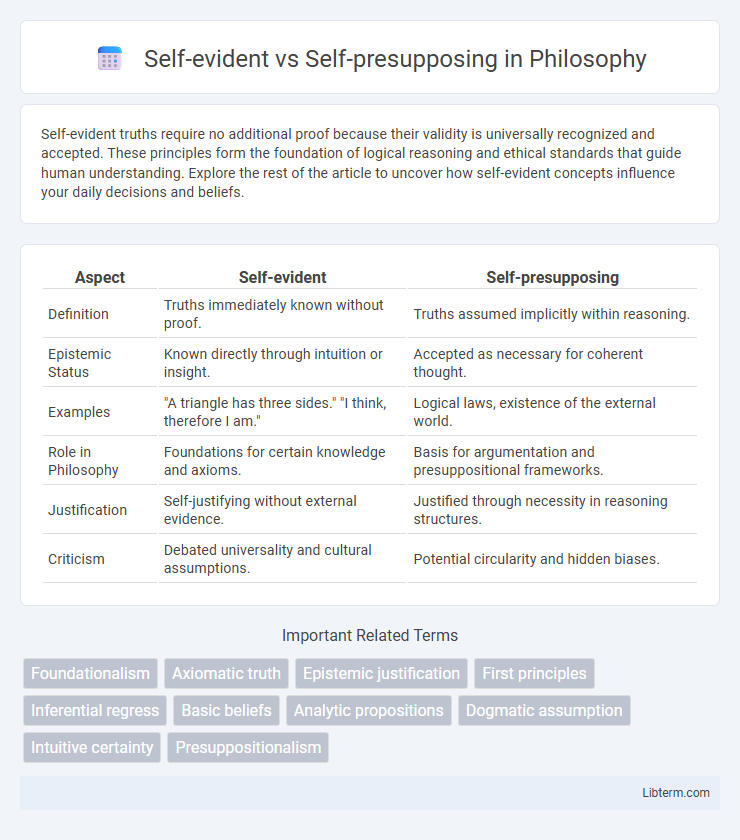Self-evident truths require no additional proof because their validity is universally recognized and accepted. These principles form the foundation of logical reasoning and ethical standards that guide human understanding. Explore the rest of the article to uncover how self-evident concepts influence your daily decisions and beliefs.
Table of Comparison
| Aspect | Self-evident | Self-presupposing |
|---|---|---|
| Definition | Truths immediately known without proof. | Truths assumed implicitly within reasoning. |
| Epistemic Status | Known directly through intuition or insight. | Accepted as necessary for coherent thought. |
| Examples | "A triangle has three sides." "I think, therefore I am." | Logical laws, existence of the external world. |
| Role in Philosophy | Foundations for certain knowledge and axioms. | Basis for argumentation and presuppositional frameworks. |
| Justification | Self-justifying without external evidence. | Justified through necessity in reasoning structures. |
| Criticism | Debated universality and cultural assumptions. | Potential circularity and hidden biases. |
Understanding "Self-Evident": Definition and Origins
Self-evident" refers to truths or propositions that are immediately known and require no further proof or explanation, rooted in the philosophy of epistemology and classical logic. The concept traces back to ancient Greek philosophy, notably Aristotle, who emphasized first principles as inherently understood facts. Understanding self-evident knowledge involves recognizing intuitive axioms that form the foundation for deductive reasoning without reliance on external validation.
What Does "Self-Presupposing" Mean?
Self-presupposing refers to a concept or statement that assumes the truth of what it intends to establish, forming a foundational belief that cannot be proven without circular reasoning. Unlike self-evident truths, which are immediately obvious and require no further justification, self-presupposing claims rely on the acceptance of certain premises as given. This means that understanding self-presupposing involves recognizing its dependence on implicit assumptions rather than direct evidence or logical deduction.
Key Differences Between Self-Evident and Self-Presupposing
Self-evident truths are statements or principles that are immediately known to be true without requiring external proof, such as mathematical axioms or logical tautologies. In contrast, self-presupposing concepts rely on underlying assumptions that must be accepted for the statement to hold meaning, often seen in philosophical or linguistic frameworks. The key difference lies in self-evidence being inherently understood, while self-presupposing depends on prior beliefs or contextual acceptance.
Historical Context: Philosophers and Their Perspectives
The distinction between self-evident and self-presupposing truths traces back to classical philosophers such as Aristotle, who emphasized self-evidence as a foundation for knowledge, while later figures like Kant argued that certain concepts are self-presupposing, underpinning our understanding of experience. Descartes' Meditations highlighted self-evident truths through clear and distinct ideas, contrasting with Hegel's philosophy, which framed knowledge development as inherently self-presupposing within historical dialectics. This evolving debate reflects how epistemological perspectives shifted from a focus on immediate clarity to recognizing the underlying assumptions embedded in cognition and conceptual frameworks.
Role in Logic and Argumentation
Self-evident propositions serve as foundational truths in logic and argumentation, requiring no further proof due to their inherent clarity and intuitive acceptance. Self-presupposing statements, in contrast, depend on the acceptance of underlying assumptions or prior beliefs, making their validity contingent on these premises. Understanding the distinction is crucial for constructing sound arguments, as self-evident claims establish unquestionable bases, whereas self-presupposing assertions necessitate critical examination of foundational assumptions.
Examples of Self-Evident Statements
Self-evident statements are propositions that are true by the very meaning of the words and require no further proof, such as "All bachelors are unmarried men" or "A triangle has three sides." These statements are intuitively obvious and universally accepted because their truth is inherent in the definitions involved. In contrast, self-presupposing statements rely on assumptions that must be accepted beforehand, like "The current king of France is bald," which presupposes the existence of a current king of France.
Illustrative Cases of Self-Presupposing Claims
Self-presupposing claims inherently assume the truth of the proposition they present, unlike self-evident claims which are accepted as immediately obvious without proof. Illustrative cases of self-presupposing claims include statements like "I am speaking now," which presupposes the speaker's existence and current action. These claims function in language as foundational assertions that require no external validation yet depend on the context for their intelligibility.
Implications for Epistemology
Self-evident beliefs serve as foundational knowledge in epistemology, requiring no further justification and providing certainty within a belief system. Self-presupposing beliefs depend on the acceptance of other foundational beliefs, highlighting the interconnected nature of knowledge and challenging the possibility of absolute certainty. These distinctions impact theories of justification, influencing debates on foundationalism and coherentism in epistemic structures.
Common Misconceptions and Overlaps
Self-evident propositions are often misconceived as requiring no justification, though they rely on immediate intellectual intuition, while self-presupposing propositions assume certain premises that may not be universally accepted. This overlap creates confusion in epistemology, as some argue that self-evident truths implicitly presuppose foundational beliefs, blurring the distinction between self-evidence and presupposition. Clarifying this boundary is essential for rigorous philosophical analysis, particularly in discussions of knowledge justification and foundationalism.
Practical Applications in Critical Thinking
Self-evident propositions require no further proof, making them foundational in critical thinking by providing unquestionable premises for argumentation. Self-presupposing statements, however, rely on assumptions that must be accepted beforehand, influencing the evaluation of reasoning processes and highlighting potential biases. Practical applications involve distinguishing these concepts to strengthen analytical rigor and avoid logical fallacies in problem-solving and decision-making.
Self-evident Infographic

 libterm.com
libterm.com